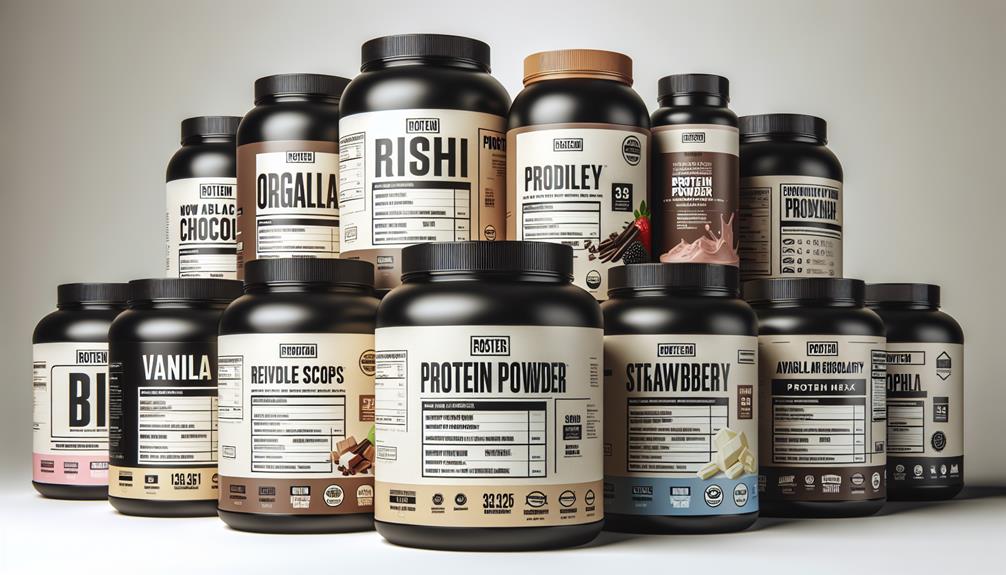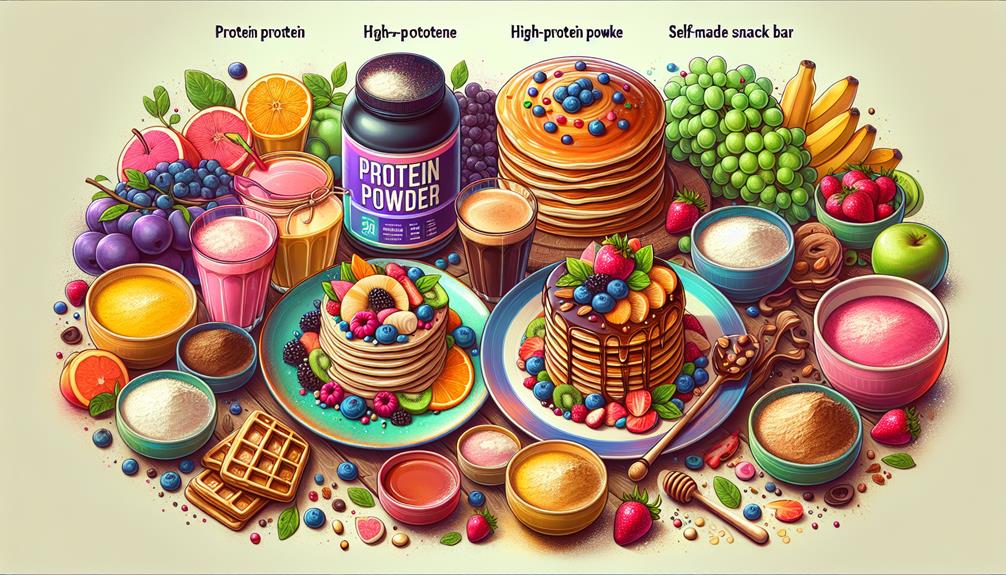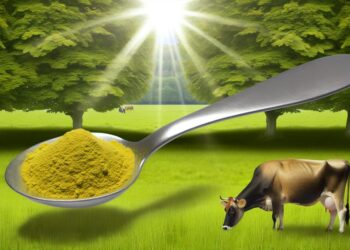By sheer coincidence, you have stumbled upon the ultimate guide to choosing the best protein powder. With so many options available on the market, it can be overwhelming to decide which one is right for you. But fear not, because this comprehensive guide is here to help you make an informed decision. Whether you're a fitness enthusiast looking to build muscle or simply trying to incorporate more protein into your diet, this guide will provide you with all the necessary information to choose the perfect protein powder. So, get ready to discover the key factors to consider, the different types of protein powders, and tips for incorporating them into your daily routine. Are you ready to unlock the secrets of the best protein powder?
Key Takeaways
- Protein powders can be derived from plant-based or animal-based sources, and the choice depends on dietary preferences and personal goals.
- When reading protein powder labels, check for high-quality protein sources, appropriate serving sizes, and additional information like amino acid profiles and allergens.
- Consider factors such as protein content, added ingredients, and third-party testing when choosing a protein powder.
- Different protein sources offer different benefits, so understanding the distinctions between whey protein, vegan options, and alternatives for lactose intolerance can help in selecting the right protein powder.
Types of Protein Powders
When it comes to choosing the best protein powder for your needs, it's important to understand the various types that are available. Two main categories of protein powders are plant-based and animal-based protein powders.
Plant-based protein powders are derived from sources such as peas, hemp, brown rice, and soy. These powders are suitable for vegans and vegetarians, as they provide a complete amino acid profile without any animal products. Plant-based protein powders are also often hypoallergenic, making them a great option for those with allergies or sensitivities.
Animal-based protein powders, on the other hand, are derived from sources like whey, casein, and collagen. Whey protein, in particular, is a popular choice due to its high bioavailability and fast absorption rate. It contains all essential amino acids and is rich in leucine, which promotes muscle growth and recovery.
Ultimately, the choice between plant-based and animal-based protein powders depends on your dietary preferences and personal goals. If you follow a vegan or vegetarian diet, or have allergies or sensitivities to dairy, plant-based protein powders may be the better option for you. However, if you're looking for rapid muscle recovery and growth, animal-based protein powders, like whey, may be more suitable.
It's important to note that both plant-based and animal-based protein powders can provide the necessary protein for muscle repair and growth. Consider consulting with a healthcare professional or registered dietitian to determine the best protein powder for your specific needs.
Understanding Protein Powder Labels
To better navigate the world of protein powders, it is crucial to understand how to interpret and analyze protein powder labels. By taking the time to read and understand the information provided on the label, you can make a more informed decision about which protein powder is right for you. Here are three key things to look for when reading protein powder labels:
- Protein Powder Ingredients: Take a close look at the list of ingredients. Look for a protein powder that contains high-quality protein sources such as whey protein isolate, casein, or plant-based proteins like pea or hemp. Avoid protein powders that contain excessive amounts of added sugars, artificial sweeteners, or unnecessary fillers.
- Protein Powder Serving Size: Pay attention to the serving size listed on the label. This will tell you how much protein powder you should use per serving. Keep in mind that the protein content listed on the label is typically based on a specific serving size. If you use more or less than the recommended serving size, the amount of protein you consume will vary.
- Additional Information: Look for any additional information provided on the label, such as the amino acid profile, the presence of any allergens, or certifications indicating quality and safety. This information can help you determine if the protein powder aligns with your specific dietary needs and preferences.
Factors to Consider When Choosing Protein Powder

Consider several important factors when selecting the right protein powder for your needs. With so many options available on the market, it's important to take into account certain factors to ensure you choose a protein powder that is both beneficial and safe for you.
| Factor | Benefits | Safety |
|---|---|---|
| Source of Protein | Different protein sources offer different benefits. Whey protein is quickly absorbed and helps with muscle recovery, while plant-based proteins are suitable for vegans and those with lactose intolerance. | Ensure that the protein source is safe and free from contaminants, such as heavy metals or harmful additives. Look for third-party testing and certifications to ensure the safety of the product. |
| Protein Content | Consider the amount of protein per serving. Higher protein content helps with muscle building and recovery. | Check for any added sugars or fillers that may reduce the actual protein content. Opt for protein powders with minimal additives and a high protein-to-calorie ratio. |
| Additional Ingredients | Some protein powders come with added vitamins, minerals, or other beneficial ingredients. | Read the ingredient list carefully to ensure that any additional ingredients are safe and suitable for your dietary needs. Avoid protein powders with excessive additives or artificial sweeteners. |
Comparing Different Protein Powder Sources
As you explore different protein powders, it's important to understand the distinctions between various protein sources and their potential benefits. Here are three key protein powder sources to consider:
- Whey Protein: Whey protein is derived from milk and is considered a complete protein, as it contains all the essential amino acids your body needs. It is quickly absorbed and digested, making it an excellent choice for post-workout recovery. Whey protein is also rich in leucine, an amino acid that plays a crucial role in muscle protein synthesis.
- Vegan Protein Options: For those following a vegan or vegetarian diet, there are several plant-based protein powders available. Some popular options include pea protein, brown rice protein, and hemp protein. These vegan protein sources are often hypoallergenic, easily digestible, and contain a good balance of essential amino acids.
- Whey Protein Alternatives: If you're lactose intolerant or prefer not to consume dairy, there are alternative protein powders to consider. These include soy protein, which is a complete protein like whey but derived from plants. Other options include egg protein and beef protein isolate, which are both rich in essential amino acids and suitable for those with specific dietary restrictions.
Tips for Incorporating Protein Powder Into Your Diet

Incorporating protein powder into your diet can be a simple and effective way to increase your daily protein intake. Whether you're an athlete looking to support muscle recovery or someone trying to maintain a healthy lifestyle, protein powder can provide the necessary nutrients to meet your goals.
One of the easiest ways to incorporate protein powder into your diet is by adding it to your favorite recipes. You can mix it into smoothies, pancakes, or even homemade energy bars. By doing so, you not only increase the protein content but also enhance the flavor and texture of your meals. There are countless protein powder recipes available online, offering a wide variety of options to suit your taste preferences.
Aside from its convenience, protein powder offers numerous benefits. It contains essential amino acids, which are the building blocks of protein that our bodies need for growth and repair. Additionally, protein powder is easily digestible and absorbed by the body, making it an efficient source of nutrition. It can also help curb hunger and support weight management goals by promoting satiety.
Frequently Asked Questions
Can Protein Powder Be Used as a Meal Replacement?
Yes, protein powder can be used as a meal replacement. It is a convenient option for post-workout recovery and there are different types available such as whey, casein, and plant-based powders that offer various benefits.
Are There Any Potential Side Effects of Consuming Protein Powder?
Potential allergic reactions and long-term effects are possible when consuming protein powder. It's important to be aware of any allergies and to use protein powder as part of a balanced diet.
Can Protein Powder Help With Weight Loss?
Protein powder can help with weight loss by promoting muscle gain and increasing satiety. It is a convenient and effective way to meet your protein needs, but remember to also focus on a balanced diet and exercise routine.
How Much Protein Powder Should I Consume per Day?
To maximize muscle gain, aim to consume 0.8-1 gram of protein per pound of body weight daily. Protein powder can help meet this requirement conveniently. However, it's important to consider your digestive health and choose a powder that suits your needs.
Is It Safe to Consume Protein Powder During Pregnancy or While Breastfeeding?
During pregnancy or while breastfeeding, it is important to consider safety concerns and recommended protein intake. Consult with your healthcare provider to determine if protein powder is safe for you and your baby.
Conclusion
So, there you have it! With the comprehensive guide we provided, you are now equipped with the knowledge to choose the best protein powder for your needs. Remember to consider factors such as your fitness goals, dietary restrictions, and personal preferences when making your decision. By incorporating protein powder into your diet, you can enhance your workouts, support muscle growth, and promote overall health and wellness. Start experimenting and find the perfect protein powder that fits your lifestyle today!














